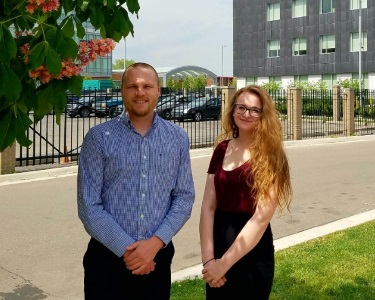B.S.W. student gets university funding to join study examining predictors of heroin abuse recovery

Wayne State B.S.W. student Lauren Notoriano has received a Wayne State Undergraduate Research Opportunities Program award to serve as study coordinator for an examination of psychosocial predictors of treatment outcomes among heroin-dependent patients. The study is led by Assistant Social Work Professor Jamey Lister, who has a dual faculty assignment with the School of Medicine and who will serve as Notoriano's faculty mentor on the project.
Notoriano, who will be a senior at Wayne State this fall, will work with patients in methadone treatment at Wayne State's Tolan Park Research Clinic. Notoriano will assist the research team with subject recruitment and scheduling, data collection and management, and other study-related tasks. With help from Principle Investigator Lister, who is collaborating on the study with co-investigators Mark Greenwald and David Ledgerwood of the School of Medicine, Notoriano will write a qualitative paper on her experiences working with heroin-dependent populations and present her findings at the WSU Undergraduate Research Conference.
Lister said Notoriano's participation in the study advances a key public health goal of training more social workers to treat heroin and opioid abuse, which the National Institute on Drug Abuse has described as a serious public health problem that requires more research on causes and treatment. A recent report by Michigan's Prescription Drug and Opioid Abuse Task Force noted that Michigan hospitalizations involving opioids more than doubled from 2000 to 2011, while the state's heroin-related overdose death rate doubled in just three years (from 2009 to 2012). In Detroit, heroin abuse has been a public health problem for decades; currently, one in three patients seeking drug abuse treatment in the city is dealing with heroin as their primary drug of abuse. Lister said the demand for social workers to integrate psychosocial knowledge to current heroin abuse treatment protocols (i.e., methadone treatment) is of particular significance in Detroit.
"People with heroin abuse histories often have experienced hardships across domains, including consequences to their physical health like HIV and Hepatitis C, difficulties in their family and interpersonal relationships, and experiences in economically disadvantaged communities. Social workers are uniquely trained to explore the intersection of these factors when working alongside interdisciplinary teams of addiction researchers and service providers," said Lister. "A lot of research on treatment for heroin abuse has focused on how best to deliver pharmacologically-based interventions like methadone, and now there's an acute need for research on medication-assisted treatment that integrates psychosocial knowledge to methadone treatment. This is something social workers can readily bring to the table."
The study Notoriano is coordinating, and the guide she will write for social workers who work with this vulnerable population after disseminating her findings, will help meet that need. With funding from a WSU Office of the Provost University Research Grant, Lister and his team will survey patients at Tolan Park about individual, relational, and community-level risk and protective factors that may influence their success in treatment. Identifying links between treatment success and psychosocial factors "" which could include social support, motivation to change, access to health care and transportation, and co-occurring mental health conditions and/or trauma histories "" might help to better develop more targeted treatment approaches.
Notoriano, who plans to pursue a career in policy and research, said she is passionate about advocating for underserved populations such as the patients at Tolan Park. She credits the School of Social Work's Student Mentor Applied Research Team (SMART) Learning Community, which helps students explore various research methodologies and promotes student-faculty research collaborations, and influential professors from the School of Social Work with nurturing her interest in social work research. Prior to joining Lister's study, she assisted Social Work's Associate Dean for Research Joanne Sobeck and Assistant Professor for Research Joanne Smith-Darden on a study of appropriate consumer use of antibiotics in Metro Detroit. That study was conducted in partnership with Henry Ford Health System with funding from Wayne State's Urban Center for Antimicrobial Resistance, Discovery, Education and Stewardship.
Lister praised Notoriano's "intrinsic motivation, optimism, and the initiative she has taken in pursuing research opportunities at Wayne State."
"This experience will help her get immersed in the research culture and the treatment of heroin dependency," said Lister, adding that he would like to see Notoriano publish her experiences with the study in a social work journal. "She has the potential to be a leader in the area of social work and addiction."